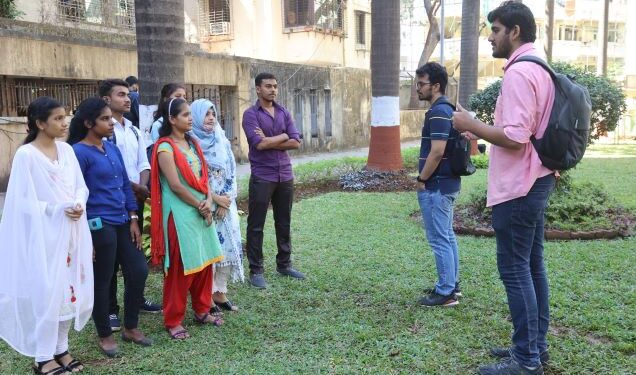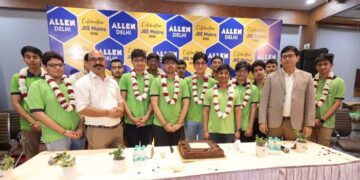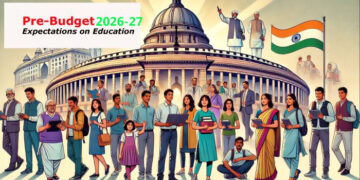By Aditya Malik
 In the dynamic realm of education, lot has changed over the past four years in particular. COVID-19 pandemic, brought unprecedented disruptions and forced educational institutions worldwide to rapidly adapt to remote learning, hybrid models, and now the world of education is ever-changed while reimagination of the entire process is still in progress. Then our country also rolled out a new National Education Policy (NEP) in 2020 after 34 years and its implementation is adding own dynamics and innovative solutions to these challenges.
In the dynamic realm of education, lot has changed over the past four years in particular. COVID-19 pandemic, brought unprecedented disruptions and forced educational institutions worldwide to rapidly adapt to remote learning, hybrid models, and now the world of education is ever-changed while reimagination of the entire process is still in progress. Then our country also rolled out a new National Education Policy (NEP) in 2020 after 34 years and its implementation is adding own dynamics and innovative solutions to these challenges.
More than ever, during this period, students have grappled with disruptions to their learning routines, social isolation, and unequal access to technology and support services. Educators have faced the daunting task of pivoting to remote teaching, navigating technical challenges, and addressing the diverse needs of students in virtual environments. Administrators have been tasked with balancing budget constraints, safety protocols, and evolving guidelines, often amidst conflicting priorities and limited resources.
Navigating challenges in education is an ongoing journey that requires collective effort, innovation, and resilience. By prioritizing social-emotional learning, embracing technology, promoting equity and inclusion, investing in professional development, fostering collaboration and communication, implementing flexible policies and practices, and enhancing crisis preparedness, educational institutions can cultivate a culture of resilience that empowers students, educators, and communities to thrive in the face of adversity.
At its core, resilience refers to the ability of individuals and institutions to bounce back from setbacks, adapt to change, and thrive despite adversities. In our case, resilience entails equipping students, educators, and institutions with the tools, strategies, and support systems necessary to navigate challenges and emerge stronger. Resilience in education encompasses a multifaceted approach, involving emotional, cognitive, and institutional dimensions.
Strategies for Building Resilience
Building resilience in education requires a comprehensive and collaborative approach that addresses the multifaceted needs of individuals and institutions. Here are some elaborate strategies to consider:
Promoting Social-Emotional Learning (SEL): Integrating SEL into the curriculum is essential for nurturing students’ emotional intelligence, self-awareness, and interpersonal skills. Comprehensive SEL programs encompass a range of competencies, including self-regulation, empathy, and responsible decision-making. By embedding SEL principles into teaching practices and school culture, educators can create supportive learning environments where students feel valued, understood, and empowered to navigate challenges effectively.
Embracing Technology: Technology plays a pivotal role in facilitating learning experiences, fostering collaboration, and adapting to changing circumstances. Educators can leverage a diverse array of digital tools, platforms, and resources to engage students, personalize instruction, and facilitate communication. From interactive multimedia presentations to virtual simulations and online collaboration tools, technology offers myriad opportunities to enhance learning outcomes and promote resilience in the digital age.
Equity and Inclusion: Addressing educational inequities is paramount for building resilience across diverse communities. This entails acknowledging and dismantling systemic barriers that perpetuate disparities in access, opportunities, and outcomes. By adopting inclusive policies, practices, and initiatives, educational institutions can create equitable learning environments where all students have the support and resources they need to succeed. This may involve providing targeted interventions for marginalized populations, investing in culturally responsive pedagogy, and fostering a sense of belonging for students from diverse backgrounds.
Professional Development: Continuous learning and professional development are essential for equipping educators with the knowledge, skills, and competencies needed to navigate complex challenges effectively. Professional development opportunities may encompass workshops, seminars, conferences, and online courses focused on pedagogical best practices, technology integration, cultural competency, and trauma-informed teaching strategies. By investing in educators’ professional growth and well-being, educational institutions can cultivate a resilient workforce capable of adapting to evolving demands and supporting student success.
Collaboration and Communication: Open communication and collaboration are fundamental for fostering resilience and shared ownership within educational communities. This involves establishing clear channels of communication among stakeholders, including students, parents, educators, administrators, and community partners. By fostering a culture of collaboration, transparency, and trust, educational institutions can leverage collective expertise and resources to address challenges more effectively and promote resilience across the system.
Flexible Policies and Practices: Flexibility is key for adapting to evolving circumstances and meeting the diverse needs of students and educators. Educational institutions should strive to implement flexible policies and practices that accommodate varying learning styles, preferences, and circumstances. This may involve rethinking traditional approaches to assessment, grading, and attendance to provide greater flexibility and autonomy for learners. Additionally, institutions can explore alternative scheduling models, such as hybrid learning, blended instruction, and asynchronous coursework, to accommodate diverse learning preferences and logistical constraints.
Crisis Preparedness: Proactive planning and crisis preparedness are essential for mitigating the impact of future disruptions and fostering resilience within educational systems. This entails developing comprehensive contingency plans, establishing clear protocols for communication and decision-making, and investing in infrastructure resilience. By anticipating potential challenges and developing robust response strategies, educational institutions can minimize disruptions, safeguard continuity of learning, and ensure the well-being of students and staff during times of crisis.
The Road Ahead
As we look to the future, it is imperative that we continue to prioritize resilience-building efforts within the educational landscape. By embracing change, learning from setbacks, and supporting one another, we can transform challenges into opportunities for growth, innovation, and collective action. Together, we can build a more resilient and inclusive educational system that equips all learners with the skills, knowledge, and mindset needed to succeed in an ever-changing world.
(The author is the CEO of Veranda Highered)












